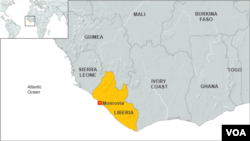The faculty of the University of Liberia has decided to stop teaching until Vice President for Academic Affairs and Provost Wede Elliott Brownell resigns.
In a letter to the university’s president, Emmett Dennis, the faculty association said the school has experienced a drastic decline in academic standards since Brownell’s appointment.
They also said inconsistencies in her reform policy have led to “unnecessary” student failures and overcrowded classrooms.
Dr. Brownell was not immediately available for comment. But Vice President for University Relations Momolu Getaweh said President Dennis has scheduled a meeting Thursday to discuss the lecturers’ demands.
Clifford Young, president of the University Faculty Association said Brownell does not have the relevant experience to be the Vice President for Academic Affairs.
“The faculty met on this 20th day of November AD 2013 to discuss matters relating to the backward trend the University of Liberia has taken based on the fact that, since the appointment of the Vice President for Academic Affairs and the Provost, Dr. Wede Elliott Brownell, the university has declined immensely. She lacks the experience [and] the qualifications to head the Vice President for Academic Affairs position,” he said.
University students protested earlier this year demanding Brownell resign. They said her reform policies impacted negatively on student performance.
The students cited “inefficiency” in administering class schedules which they said has led to courses being scheduled on the same day and the same time during regular test and exam periods.
“Decisions relating to scheduling, decisions relating to ensuring that the university academic programs are properly planned are always controversial, which is now leading students into violent resistance that is disrupting academic activities at the university,” Young said.
Young said, as faculty members, the lecturers do not get involved in strike actions, but they can only “disengage” from activities they normally undertake.
Young said the lecturers are also demanding an increase in their salaries which, he said, was promised them by the university administration.
“We are also demanding that our salaries and incentives should be adjusted in an upward fashion, which was promised by the administration, and this they haven’t done,” Young said.
He said the university students support the lecturer’s decision.
“We’re saying here that the students are in approval of this action because they have even asked for her removal on several occasions. Even the staff of the university was jubilating today,” Young said.
Young said despite President Ellen Johnson Sirleaf’s strong support of the university, there remains a huge disparity between lecturers’ salaries and the salaries of university administrators.
In a letter to the university’s president, Emmett Dennis, the faculty association said the school has experienced a drastic decline in academic standards since Brownell’s appointment.
They also said inconsistencies in her reform policy have led to “unnecessary” student failures and overcrowded classrooms.
Dr. Brownell was not immediately available for comment. But Vice President for University Relations Momolu Getaweh said President Dennis has scheduled a meeting Thursday to discuss the lecturers’ demands.
Clifford Young, president of the University Faculty Association said Brownell does not have the relevant experience to be the Vice President for Academic Affairs.
“The faculty met on this 20th day of November AD 2013 to discuss matters relating to the backward trend the University of Liberia has taken based on the fact that, since the appointment of the Vice President for Academic Affairs and the Provost, Dr. Wede Elliott Brownell, the university has declined immensely. She lacks the experience [and] the qualifications to head the Vice President for Academic Affairs position,” he said.
University students protested earlier this year demanding Brownell resign. They said her reform policies impacted negatively on student performance.
The students cited “inefficiency” in administering class schedules which they said has led to courses being scheduled on the same day and the same time during regular test and exam periods.
“Decisions relating to scheduling, decisions relating to ensuring that the university academic programs are properly planned are always controversial, which is now leading students into violent resistance that is disrupting academic activities at the university,” Young said.
Young said, as faculty members, the lecturers do not get involved in strike actions, but they can only “disengage” from activities they normally undertake.
Young said the lecturers are also demanding an increase in their salaries which, he said, was promised them by the university administration.
“We are also demanding that our salaries and incentives should be adjusted in an upward fashion, which was promised by the administration, and this they haven’t done,” Young said.
He said the university students support the lecturer’s decision.
“We’re saying here that the students are in approval of this action because they have even asked for her removal on several occasions. Even the staff of the university was jubilating today,” Young said.
Young said despite President Ellen Johnson Sirleaf’s strong support of the university, there remains a huge disparity between lecturers’ salaries and the salaries of university administrators.






